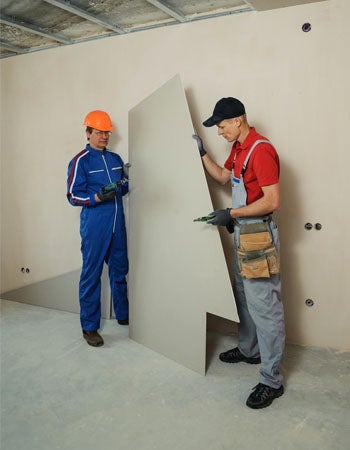
USG Sheetrock Easy Sand is a joint compound that is used to fill, smooth, and bond interior and exterior above grade concrete and gypsum ceilings. It is suitable for surface texture and laminating Gypsum panels. This type is chemically setting and has a high amount of durability. You have the option to select from a range of formulations in order to find what you need. These compounds are weather-resistant and can be used in damp environments. These compounds provide a great bond and are convenient for finishing drywall interiors.
Easy Sand 20 is a quick-drying, setting joint compound that can be used in interior drywall. It can be more difficult to use, but it is also sandable. It can take up to 2 days for the mud to dry in different climates. However, it can be sanded quickly to give it a smooth finish. Easy Sand 90 may be a good option if this is your first time using joint compound. But be careful when using this joint compound.
If you are looking for a more moderately level joint compound, you might consider Easy Sand 45. It is a good choice for intermediate people and is easy to apply. Compared to Easy Sand 210, it is more sandable, has a slightly lower hardness, and is a bit easier to use. Easy Sand 45 is sandable and can be used over tape. It also makes it easy to clean up. Mixing the mud takes about 45 minutes.
Easy Sand 210 is a bit more difficult to work with than Easy Sand 5, but they are still very sandable. They can be used as filler, but they're best used as a tapping coating. Both can be found in natural colors and form a good bond.

ES compounds have the ability to withstand temperature changes and humidity, and offer quick, efficient and smooth finishes. Their fast setting times make them ideal for patching and repairing drywall. There are many options for shrinkage, setting time and other factors. They are great for a wide range of projects such as wall, floor and floor repairs and also for finishing and texturing.
FAQ
How do you sell your house quickly and without the need to pay realtor fees
You should immediately start searching for buyers if you are looking to quickly sell your house. This means you must be willing to pay whatever the buyer offers. But, you may lose potential buyers if your wait is too long.
Is there anything I could do to save on my home renovations?
By doing all the work yourself, you can save money. One way to save money is to try and reduce the number people who are involved in the remodeling process. Another option is to try to lower the cost of the materials you use in your renovations.
How important is it that you are preapproved for a loan?
It is important to get preapproved for a mortgage because you will know how much you can borrow. This will help you decide if you are eligible for a loan program.
Do I need an architect/builder?
If you are planning to renovate your own home, it may be easier to just hire someone else to do the work for you. If you're looking to purchase a home, an architect or builder can help you achieve your goals.
How Much Does It Cost To Renovate A House?
The cost of renovations depends on what material is used, the size of project and how complicated the job is. Some materials, like wood, need special tools like saws and drilling while others, like steel require no additional tools. The price of renovations will depend on whether you need your contractor to do everything or if the work is done by you.
The average cost of home improvement projects ranges from $1,000 to $10,000. If you are looking to hire professionals, expect to pay between $5,000 and $25,000. The cost to hire professionals would range from $5,000 to $25,000,000. On the other side, you could spend up to $100,000 if your task is completed entirely yourself.
There are many factors that influence the final cost of renovations. They include the type of material used (e.g. You can choose between brick or concrete, and the size of your project as well. When estimating the total cost for renovation, it is important to keep these factors in your mind.
How can you avoid being ripped off during renovations to your house?
To avoid being scammed, it is essential to fully understand the terms of your contract. Read the fine print before signing any contract. Also, don't sign blank contracts. Always ask for a copy of the signed contract.
Can you live in a house during renovation?
Yes, you can live in your house while you renovate it.
Can you live in a house and have renovations ongoing? It depends on the length of the construction. If the renovation process lasts less than 2 months, then yes, you can live in your home while it's under construction. However, if the renovation project lasts longer than two months, then no, you cannot live in your home while the renovation is taking place.
The reason why you should not live in your home when there is a major construction project going on is because you might get hurt or even killed due to falling objects from the building site. The heavy machinery and noise pollution at the job site can also cause dust and noise pollution.
This is especially true for multi-story houses. In this case, the sound and vibration created by the construction workers might cause severe damage to your property and its contents.
As I mentioned before, while your home is being remodeled, you'll have to manage the inconveniences of living in temporary shelters. This means you won’t have the same amenities as your own home.
As an example, your washer and dryer will be out of commission while they are being repaired. Additionally, the smell of paint fumes or other chemicals will be a constant annoyance as well as the banging sound made by workers.
All of these factors can create stress and anxiety for you and your loved ones. It is therefore important to plan ahead so that you don't end up feeling overwhelmed by the situation.
To avoid costly mistakes, do your homework before you make any decisions about renovating your home.
You can also consider professional advice from a trusted contractor to ensure smooth running of your project.
Statistics
- ‘The potential added value of a loft conversion, which could create an extra bedroom and ensuite, could be as much as 20 per cent and 15 per cent for a garage conversion.' (realhomes.com)
- Most lenders will lend you up to 75% or 80% of the appraised value of your home, but some will go higher. (kiplinger.com)
- The average fixed rate for a home-equity loan was recently 5.27%, and the average variable rate for a HELOC was 5.49%, according to Bankrate.com. (kiplinger.com)
- Rather, allot 10% to 15% for a contingency fund to pay for unexpected construction issues. (kiplinger.com)
- They'll usually lend up to 90% of your home's "as-completed" value, but no more than $424,100 in most locales or $636,150 in high-cost areas. (kiplinger.com)
External Links
How To
What should I budget for the restoration of my old home?
The cost of renovating your home depends on how many rooms you want to update, what kind of renovations you plan to do, where you live, and whether you're doing it yourself or hiring professionals. Depending upon the size of the renovation, the average cost ranges between $10,000 and $50,000.
You'll probably get less than the market value of your home if you don’t include the cost of repairs, upgrades and other improvements. You might even lose money if you put too little effort into making your home look its best before selling. However, investing enough energy and time into improving the appearance of your home can help increase the value you get for it when you list it.
To help you decide which projects to undertake first, consider these factors:
-
Your budget. Start small if you have a tight budget. For example, you can tackle one room at a time, such as painting walls or replacing flooring. Or you can hire a contractor who specializes in kitchen remodeling to make some major changes without spending a lot of cash.
-
Your priorities. Your priorities. Do you want your home to be in a better condition? Or do you just need to fix a few problems? If you choose to tackle only one issue, keep in mind that minor issues can add up quickly. For instance, if your roof leaks every time it rains, you might end up having to replace it sooner rather than later.
-
Your timeline. Consider your timeline. If you're considering buying a property next year and want hardwood floors installed or new bathroom fixtures, then you won't want them to be done right away. Instead, you might wait until you move out of your existing home to make those updates.
-
Your skills. If you are unable to do a certain task, get someone else to do it. You might hire a cabinet maker if you don't have the skills to build custom cabinets.